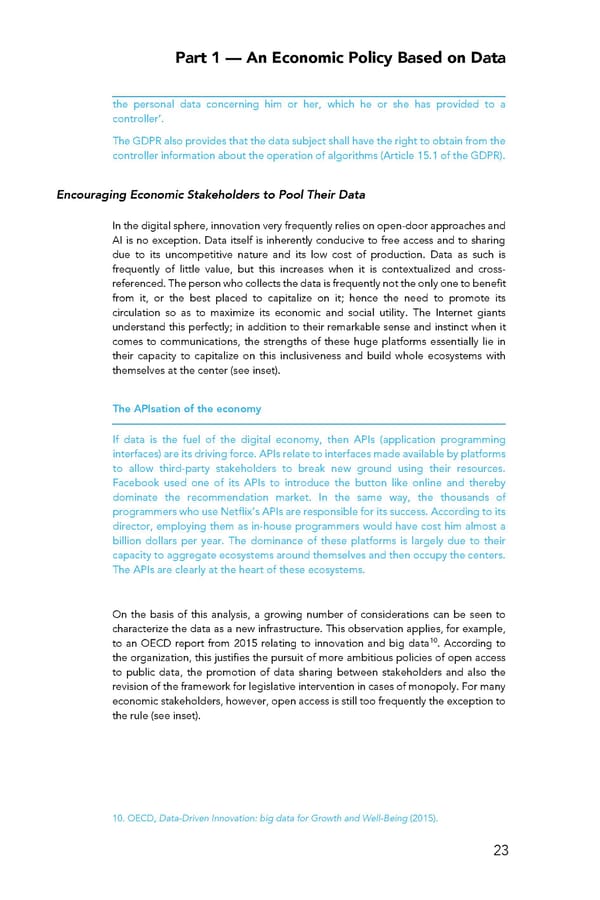Part 1 — An Economic Policy Based on Data the personal data concerning him or her, which he or she has provided to a controller’. The GDPR also provides that the data subject shall have the right to obtain from the controller information about the operation of algorithms (Article 15.1 of the GDPR). Encouraging Economic Stakeholders to Pool Their Data In the digital sphere, innovation very frequently relies on open-door approaches and AI is no exception. Data itself is inherently conducive to free access and to sharing due to its uncompetitive nature and its low cost of production. Data as such is frequently of little value, but this increases when it is contextualized and cross- referenced. The person who collects the data is frequently not the only one to benefit from it, or the best placed to capitalize on it; hence the need to promote its circulation so as to maximize its economic and social utility. The Internet giants understand this perfectly; in addition to their remarkable sense and instinct when it comes to communications, the strengths of these huge platforms essentially lie in their capacity to capitalize on this inclusiveness and build whole ecosystems with themselves at the center (see inset). The APIsation of the economy If data is the fuel of the digital economy, then APIs (application programming interfaces) are its driving force. APIs relate to interfaces made available by platforms to allow third-party stakeholders to break new ground using their resources. Facebook used one of its APIs to introduce the button like online and thereby dominate the recommendation market. In the same way, the thousands of programmers who use Netflix’s APIs are responsible for its success. According to its director, employing them as in-house programmers would have cost him almost a billion dollars per year. The dominance of these platforms is largely due to their capacity to aggregate ecosystems around themselves and then occupy the centers. The APIs are clearly at the heart of these ecosystems. On the basis of this analysis, a growing number of considerations can be seen to characterize the data as a new infrastructure. This observation applies, for example, 10 to an OECD report from 2015 relating to innovation and big data . According to the organization, this justifies the pursuit of more ambitious policies of open access to public data, the promotion of data sharing between stakeholders and also the revision of the framework for legislative intervention in cases of monopoly. For many economic stakeholders, however, open access is still too frequently the exception to the rule (see inset). 10. OECD, Data-Driven Innovation: big data for Growth and Well-Being (2015). 23
 For a Meaningful AI - Report Page 23 Page 25
For a Meaningful AI - Report Page 23 Page 25